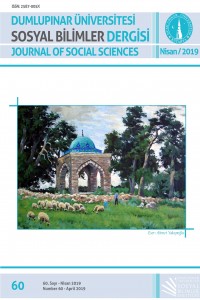Öz
Bu çalışmada, 1993-2014 yılları arasında 143
ülkenin panel verileri kullanılarak, Bilgi ve İletişim Teknolojileri (BİT) ve
insan sermayesi gelişimi arasındaki ilişkiyi incelenmiştir. Çalışmada, İnsan
sermayesi gelişimini temsil eden değişken olarak İnsan Sermayesi Endeksi
kullanılırken, BİT’lerin nüfuzu göstergeleri olarak internet kullanıcı sayısı,
sabit geniş bant abonelikleri ve cep telefonu kullanıcı sayısı değişkenleri
alınmıştır. Potansiyel çoklu bağlantı problemlerini önlemek için her bir BİT
göstergesi ayrı bir model altında değerlendirilmiştir. Tek değişkenli ve çok
değişkenli sabit zaman etkisi panel veri tahmin sonuçları, BİT penetrasyonu ile
insan sermayesi gelişimi arasında pozitif ve güçlü bir ilişki olduğunu
göstermektedir. Tahmini sonuçlarının sağlamlığını kontrol etmek için çok
değişkenli modeller gelişmekte olan ülkeler alt örneklemi için de tahmin
edilmiştir. Tahmin sonuçları önceki bulguları desteklemektedir. Ayrıca, tahmin
sonuçları araştırmada kullanılan BİT göstergeleri arasında internet
kullanıcıları sayısının beşeri sermaye üzerinde en büyük etkiye sahip olduğunu
göstermektedir.
Anahtar Kelimeler
Beşeri Sermaye Bilgi ve İletişim Teknolojileri Panel Veri Anal
Kaynakça
- Bildirici, M., Orcan, M., Sunal, S., & Aykaç, E. (2005). Determinants of human capital theory, growth and brain drain: an econometric analysis for 77 countries. Applied Econometrics and International Development, 5(2), 109-140.
- Binder, M., & Geogiadis, G. (2011). Determinants of human development: Capturing the role of institutions (CESifo Working Paper No. 3397). Retrieved from Center for Economic Studies and Ifo Institute Working Papers website: https://ideas.repec.org/p/ces/ceswps/_3397.html.
- Koyuncu, C., & Ünver, M. (2017). Information and communication technologies (ICTs) and corruption level: empirical evidence from panel data analysis. The Journal of International Scientific Researches, 2(6), 1-10.
- Koyuncu, C., Yılmaz, R., & Ünver, M. (2016). Does ICT penetration enhance tax revenue?: panel evidence Özel sayı. Anadolu Üniversitesi Sosyal Bilimler Dergisi, 16(5), 71-80.
- Koyuncu, J. Y., & Unver, M. (2017). Revisiting the nexus of infrastructure and FDI: the case of transition economies. Balkan and Near Eastern Journal of Social Sciences, 3(4), 150-156.
- Kusharjantoa, H., & Kim, D. (2011). Infrastructure and human development: the case of Java, Indonesia. Journal of the Asia Pacific Economy, 16(1), 111–124.
- Salahuddin, M., & Alam, K. (2016). Information and communication technology, electricity consumption and economic growth in OECD countries: A panel data analysis. Electrical Power and Energy Systems, 76, 185-193.
- Sapkota, J. B. (2014). Access to infrastructure and human development: Cross-country evidence (JICA-RI Working Paper No. 70). Retrieved from JICA Research Institute Working Papers website: https://www.jica.go.jp/jica-ri/publication/workingpaper/jrft3q00000025be-att/JICA-RI_WP_No.70_2014.pdf.
- Shuaibu, M., & Oladayo, P.T. (2016). Determinants of human capital in Africa: A panel data analysis. Oeconomia Copernicana, 7(4), 523-549.
Öz
In this study,
panel data for 143 countries from 1993 to 2014 are used to examine the
association between ICT penetration and human capital development. Human Capital Index is utilized as a
proxy for human capital development while ICT penetration is proxied by the
penetration of internet users, fixed broadband subscriptions,
and mobile phones. Each ICT indicator is considered in a separate model
to avoid any potential multicollinearity problems. Bivariate
and multivariate fixed time effect panel data estimation results suggest that
there is a positive and strong relationship between ICT penetration and human
capital development. Multivariate
models are also estimated for developing countries sub-sample to check the
robustness of estimation results. It is be observed that estimation results
support the previous findings. Estimation results also indicate that individuals using the Internet as
a percentage of population has the largest impact on the human capital among ICT indicators
used in the study.
Anahtar Kelimeler
Human Capital Information and Communication Technologies Panel Study
Kaynakça
- Bildirici, M., Orcan, M., Sunal, S., & Aykaç, E. (2005). Determinants of human capital theory, growth and brain drain: an econometric analysis for 77 countries. Applied Econometrics and International Development, 5(2), 109-140.
- Binder, M., & Geogiadis, G. (2011). Determinants of human development: Capturing the role of institutions (CESifo Working Paper No. 3397). Retrieved from Center for Economic Studies and Ifo Institute Working Papers website: https://ideas.repec.org/p/ces/ceswps/_3397.html.
- Koyuncu, C., & Ünver, M. (2017). Information and communication technologies (ICTs) and corruption level: empirical evidence from panel data analysis. The Journal of International Scientific Researches, 2(6), 1-10.
- Koyuncu, C., Yılmaz, R., & Ünver, M. (2016). Does ICT penetration enhance tax revenue?: panel evidence Özel sayı. Anadolu Üniversitesi Sosyal Bilimler Dergisi, 16(5), 71-80.
- Koyuncu, J. Y., & Unver, M. (2017). Revisiting the nexus of infrastructure and FDI: the case of transition economies. Balkan and Near Eastern Journal of Social Sciences, 3(4), 150-156.
- Kusharjantoa, H., & Kim, D. (2011). Infrastructure and human development: the case of Java, Indonesia. Journal of the Asia Pacific Economy, 16(1), 111–124.
- Salahuddin, M., & Alam, K. (2016). Information and communication technology, electricity consumption and economic growth in OECD countries: A panel data analysis. Electrical Power and Energy Systems, 76, 185-193.
- Sapkota, J. B. (2014). Access to infrastructure and human development: Cross-country evidence (JICA-RI Working Paper No. 70). Retrieved from JICA Research Institute Working Papers website: https://www.jica.go.jp/jica-ri/publication/workingpaper/jrft3q00000025be-att/JICA-RI_WP_No.70_2014.pdf.
- Shuaibu, M., & Oladayo, P.T. (2016). Determinants of human capital in Africa: A panel data analysis. Oeconomia Copernicana, 7(4), 523-549.
Ayrıntılar
| Birincil Dil | İngilizce |
|---|---|
| Bölüm | Makaleler |
| Yazarlar | |
| Yayımlanma Tarihi | 29 Nisan 2019 |
| Yayımlandığı Sayı | Yıl 2019 Sayı: 60 |
Kaynak Göster
Dergimiz EBSCOhost, ULAKBİM/Sosyal Bilimler Veri Tabanında, SOBİAD ve Türk Eğitim İndeksi'nde yer alan uluslararası hakemli bir dergidir.

